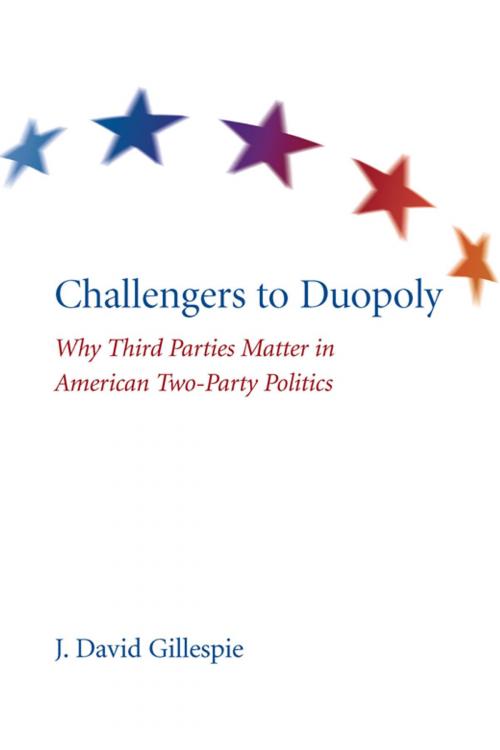Challengers to Duopoly
Why Third Parties Matter in American Two-Party Politics
Nonfiction, Social & Cultural Studies, Political Science, Government, Political Parties| Author: | J. David Gillespie | ISBN: | 9781611171129 |
| Publisher: | University of South Carolina Press | Publication: | December 7, 2012 |
| Imprint: | University of South Carolina Press | Language: | English |
| Author: | J. David Gillespie |
| ISBN: | 9781611171129 |
| Publisher: | University of South Carolina Press |
| Publication: | December 7, 2012 |
| Imprint: | University of South Carolina Press |
| Language: | English |
Building on the foundational importance of its predecessor (Politics at the Periphery, 1993), Challengers to Duopoly offers an up-to-date overview of the important history of America's third parties and the challenge they represent to the hegemony of the major parties. J. David Gillespie introduces readers to minor partisan actors of three types: short-lived national parties, continuing doctrinal and issue parties, and the significant others at the state and local levels. Woven into these accounts are profiles of some of the individuals who have taken the initiative to found and lead these parties. Ross Perot, Ralph Nader, Jesse Ventura, and other recent and contemporary electoral insurgents are featured, along with the most significant current national and state parties challenging the primacy of the two major parties. Gillespie maintains that despite the infirmities they often bear, third parties do matter, and they have mattered throughout American public life. Many of our nation's most important policies and institutional innovations—including abolition, woman suffrage, government transparency, child labor laws, and national healthcare—were third-party ideas before either major party embraced them. Additionally, third parties were the first to break every single gender, race, and sexual orientation bar on nomination for the highest offices in the land. As Gillespie illustrates in this engaging narrative, with the deck so stacked against them, it is impressive that third-party candidates ever win at all. That they sometimes do is a testament to the power of democratic ideals and the growing disdain of the voting public with politics as usual.
Building on the foundational importance of its predecessor (Politics at the Periphery, 1993), Challengers to Duopoly offers an up-to-date overview of the important history of America's third parties and the challenge they represent to the hegemony of the major parties. J. David Gillespie introduces readers to minor partisan actors of three types: short-lived national parties, continuing doctrinal and issue parties, and the significant others at the state and local levels. Woven into these accounts are profiles of some of the individuals who have taken the initiative to found and lead these parties. Ross Perot, Ralph Nader, Jesse Ventura, and other recent and contemporary electoral insurgents are featured, along with the most significant current national and state parties challenging the primacy of the two major parties. Gillespie maintains that despite the infirmities they often bear, third parties do matter, and they have mattered throughout American public life. Many of our nation's most important policies and institutional innovations—including abolition, woman suffrage, government transparency, child labor laws, and national healthcare—were third-party ideas before either major party embraced them. Additionally, third parties were the first to break every single gender, race, and sexual orientation bar on nomination for the highest offices in the land. As Gillespie illustrates in this engaging narrative, with the deck so stacked against them, it is impressive that third-party candidates ever win at all. That they sometimes do is a testament to the power of democratic ideals and the growing disdain of the voting public with politics as usual.















